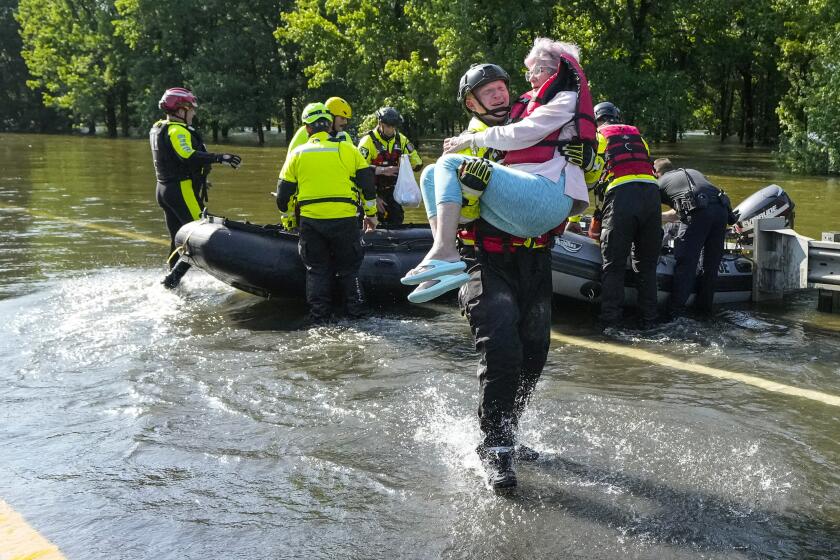Livelihoods in Lebanon Blown Out of the Water
First, the fish died.
Just days after Israeli airstrikes destroyed a power plant near the fishing harbor and sent a huge plume of oil seeping into the sea, Yahia Hamadi began seeing the sheen of their scales on the surface of the water.
The ones that weren’t dead were contaminated, the fishermen knew, and their poisoned eggs would produce no offspring next year.
It is a disaster that will last for years, fishermen here agreed when they stopped in daily to check on their boats during Israel’s relentless bombing campaign in southern Beirut.
As it happened, the trouble had only begun.
On Friday, the fishermen of Ouzai trickled toward the port as usual, only to find it no longer existed.
The fish auction house was gone. The boat repair shop was gone. So was the small cafeteria where a fisherman could get a sandwich or a cup of tea after a long day at sea.
Worst of all, so were their boats: a night-long barrage from the air and sea had left hundreds of boats in charred, smoking ruins.
“I saw something that is indescribable. It was a feeling I can’t begin to tell you. All of a sudden, I found out I have nothing,” said Hamadi, a Beirut native whose 27-foot diesel-powered boat was reduced to shards of wood floating in the inky sea.
On Saturday, as an Israeli drone circled ominously overhead, fishermen gathered cautiously at the harbor and talked of asking the government to pay compensation for their lost boats. But with total infrastructure damage in Lebanon exceeding $2 billion from the 3 1/2 -week Israeli campaign, few held out hope that their small watercraft would have much chance in competing for funds.
“I’m a fisherman. I don’t have any profession except the sea. We live thanks to the support of the sea. We don’t have anything like social security, or old-age pensions, or anything like that. What are we going to do?” said Jamal Alameh, a 47-year-old resident of this suburb south of Beirut who supported his wife and five sons from his small wooden boat and nylon nets.
Boat owners professed to be mystified about why Israel would have targeted their harbor. Its entire fleet, they said, consisted of small, family-owned boats, most of them operated by a lone man or a father and his son.
But the devastating barrage of bombs, missiles and ship’s guns that hit Ouzai early Friday may have come, in part, because of reports that two Hezbollah missiles that crippled an Israeli warship in the early days of the fighting might have been fired from the region of the harbor.
Israeli officials later alleged that elite Iranian troops had helped Lebanese militants fire the sophisticated, radar-guided missile that struck the warship, killing four sailors. Iran called the allegation “meaningless.”
Israeli airstrikes Friday also destroyed a depot in Ouzai for the Shiite Imam Sadr charitable organization that Lebanese television said was full of food packages for thousands of those displaced by the war.
On Saturday, a Hezbollah guard was patrolling the harbor, a handgun thrust into the waistband of his camouflage trousers. Shouting and fingering his gun, he refused to allow foreign visitors to approach the charred, wrecked boats, some of them still floating like ghost ships in the murky, debris-strewn water.
“There is nothing left of my boat,” said Alameh, who still owes $4,000 on it. “This port, it’s as if it were hit with a Hiroshima bomb.”
Even worse off was 40-year-old Yussuf Assaf, who had $90,000 invested in his four small boats -- nearly all of it loans from a bank. All were destroyed in the bombardment.
“Basically, I woke up this morning and realized I cannot support myself,” Assaf said. “What can I do? I have to pay back this money. There are 13 families depending on me, who work on these boats, and every one of them is gone.
“I might as well be dead.”
Issam Kataya, head of the fishermen’s syndicate in Beirut, estimated losses at $1 million to $3 million for the 240 boat owners who operated out of the port, each of whom supports his own family and perhaps those of several crew members.
Twenty boats survived.
None of the fishermen claimed to have any knowledge of Hezbollah rocket attacks; all insisted that the port had no connection to the militants. “This is a civilian port, and it’s completely abnormal to hit such a port,” Kataya said.
At the beginning of the conflict, the fishermen said, they rushed to the port to try to protect their boats. Some asked to sail them away to a safer port, but a prohibition on entering the water prevented them.
Many then begged for permission to pull the smaller boats out of the water. That, too, was denied by Lebanese authorities, who said it was too dangerous.
So they waited, visiting the harbor briefly every day, counting the days that their boats survived the onslaught, until the day they didn’t.
“We have definitely lost this season, and probably next year too,” Hamadi said. “We are paying the tax for a new Middle East.”
More to Read
Start your day right
Sign up for Essential California for news, features and recommendations from the L.A. Times and beyond in your inbox six days a week.
You may occasionally receive promotional content from the Los Angeles Times.






